【备课参考】(人教)高中英语必修5同步教学课件:Unit+5+First+aid+Learning+about+language(共53张PPT)
文档属性
| 名称 | 【备课参考】(人教)高中英语必修5同步教学课件:Unit+5+First+aid+Learning+about+language(共53张PPT) | 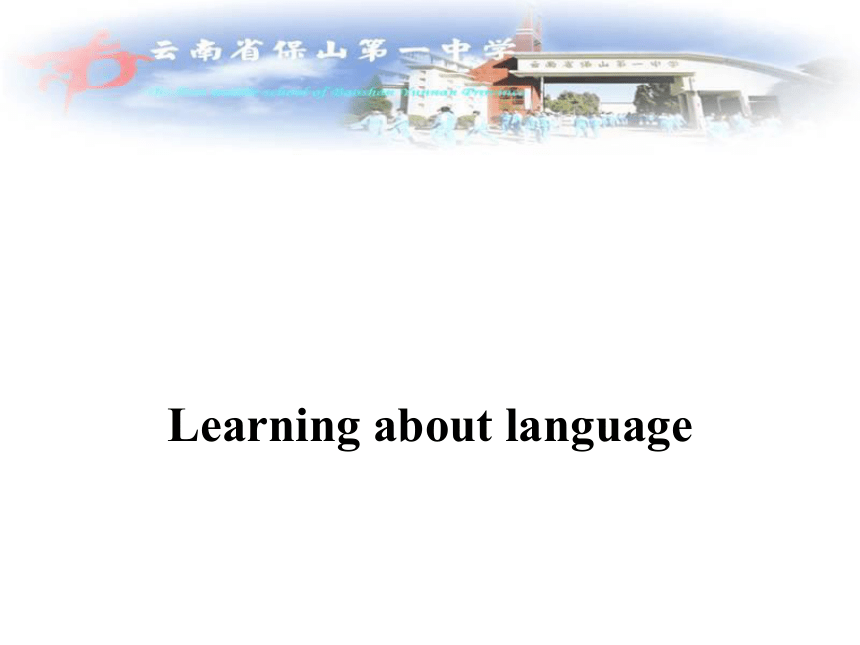 | |
| 格式 | zip | ||
| 文件大小 | 166.5KB | ||
| 资源类型 | 教案 | ||
| 版本资源 | 人教版(新课程标准) | ||
| 科目 | 英语 | ||
| 更新时间 | 2015-07-29 18:29:34 | ||
图片预览

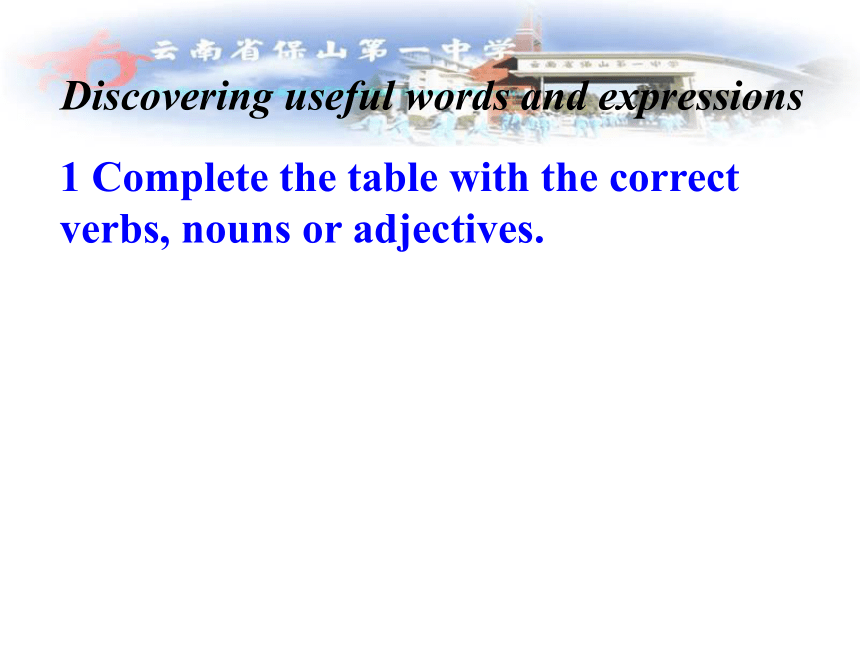
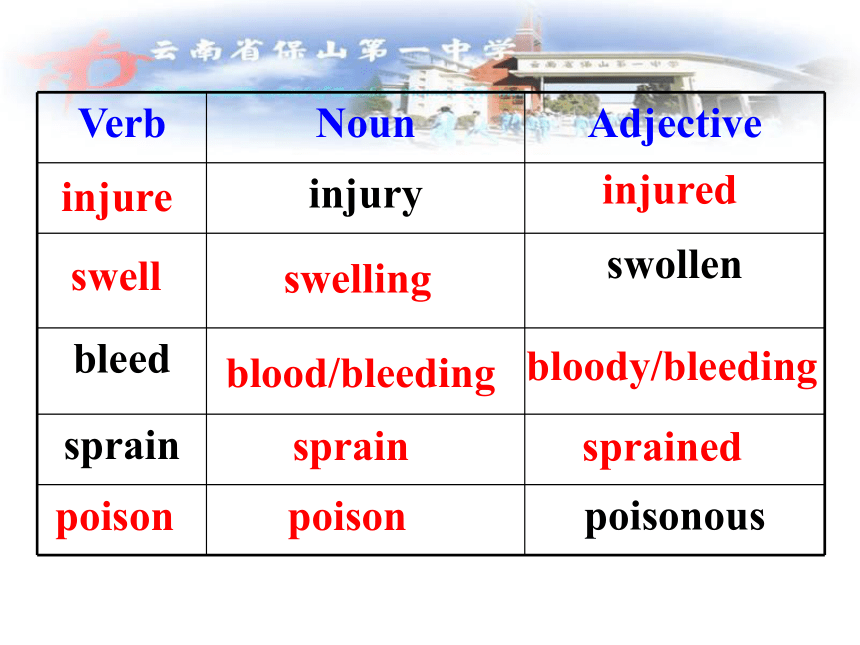
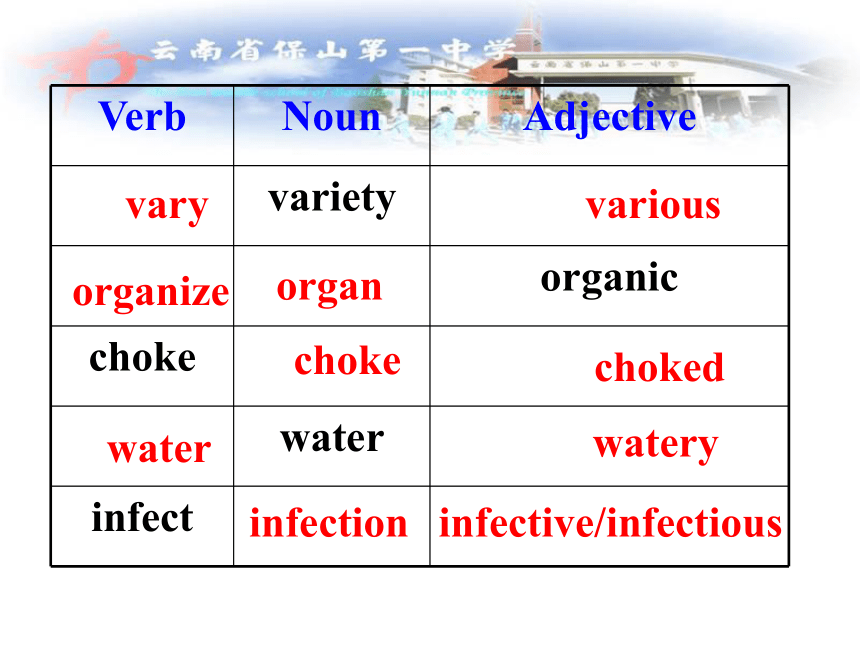


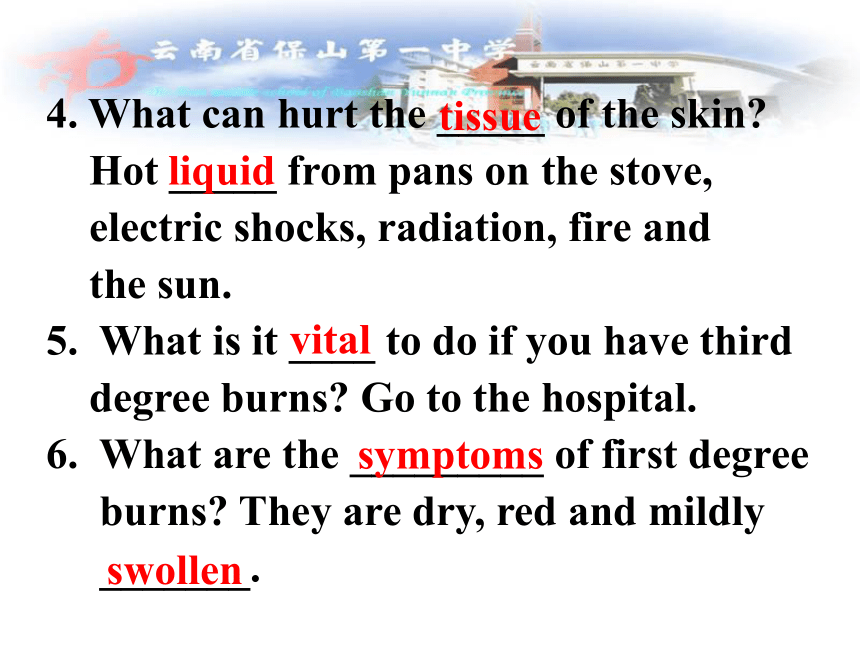
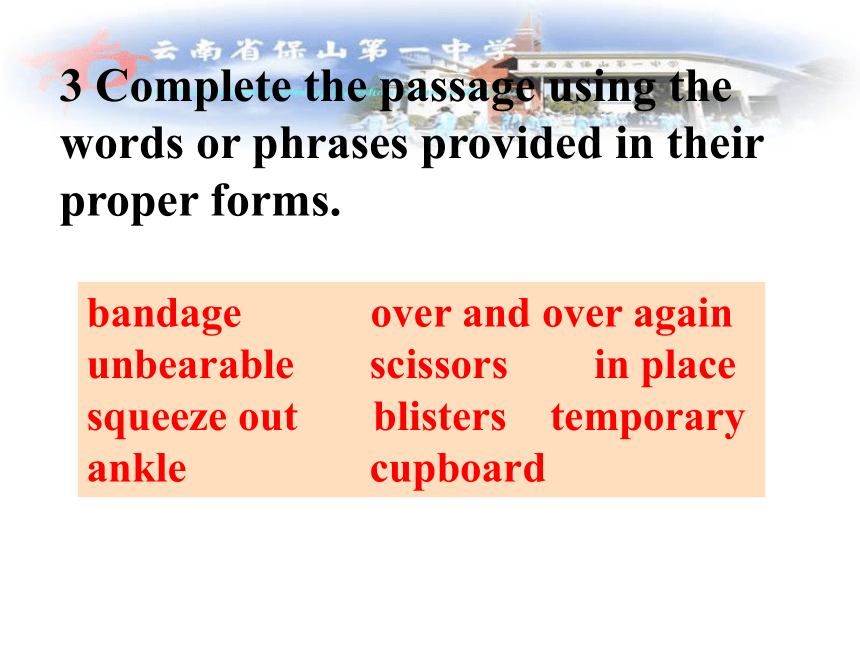
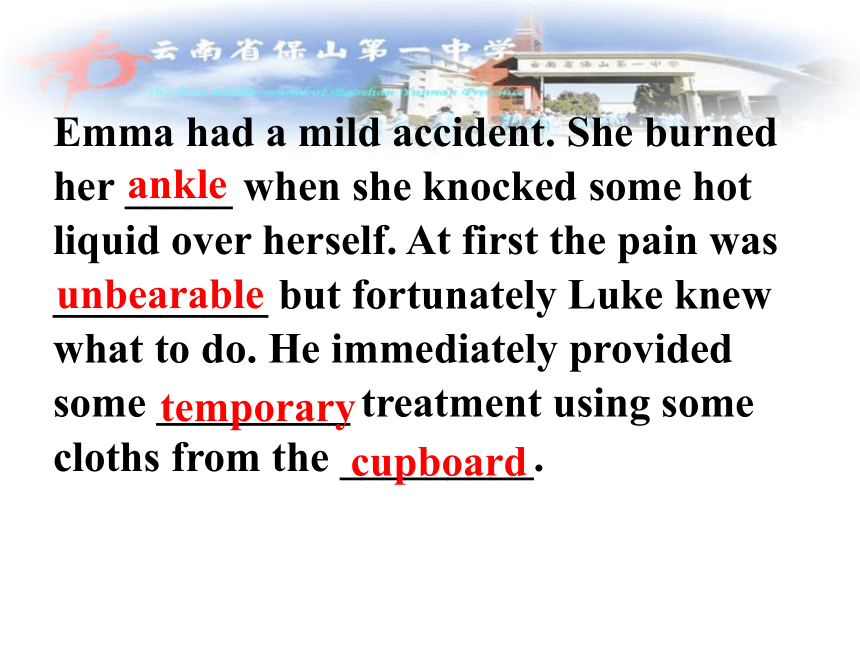
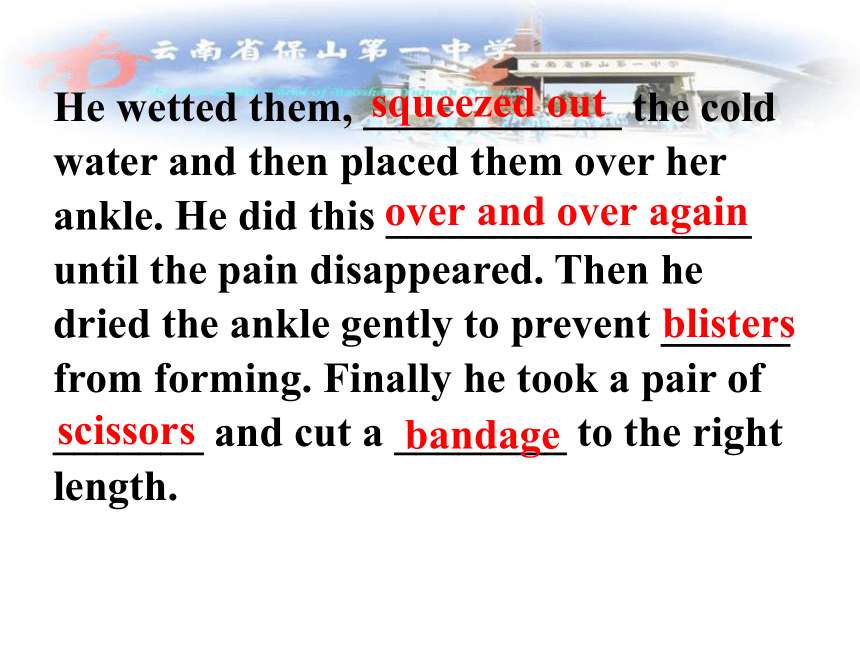
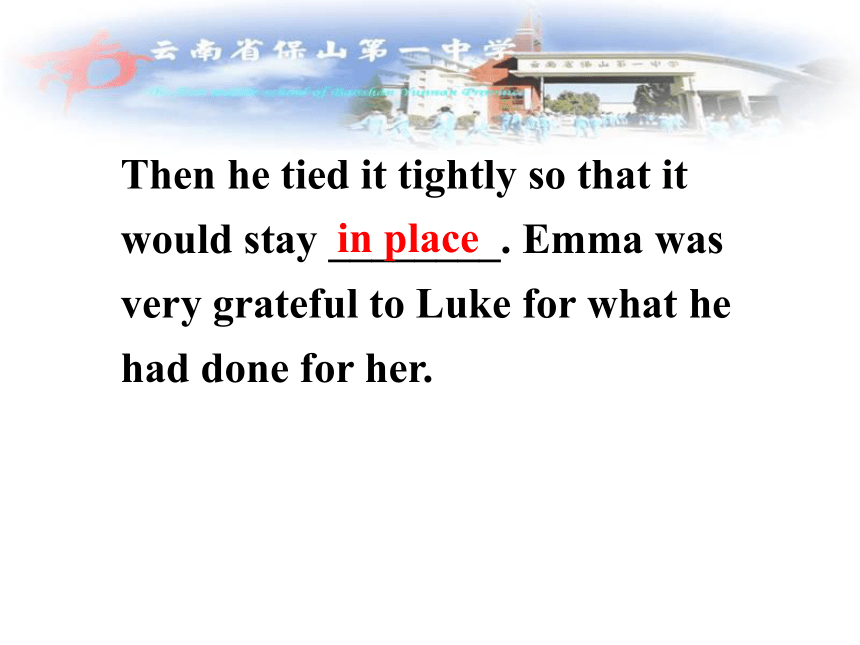
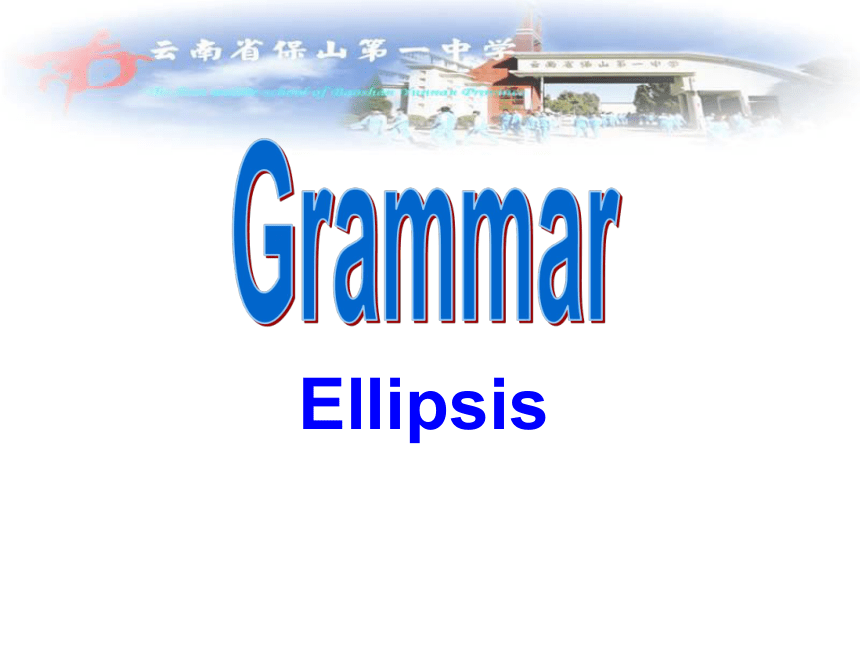
文档简介
课件53张PPT。Unit 5
First aid
Learning about language1 Complete the table with the correct verbs, nouns or adjectives.Discovering useful words and expressions injureinjured swellswellingblood/bleedingbloody/bleedingsprainsprainedpoisonpoison varyvariousorganizeorgan chokechokedwaterwateryinfectioninfective/infectious2 Complete the sentences with new words or phrases from the unit.
1. When do you need to use your _______
knowledge about? When somebody
suddenly ______ or has an accident.
2. What is the ____? It is an organ which
acts as a _______ against disease,
poisons and the sun’s harmful _____.first aidfalls illskinbarrierrays3. Why are the functions of the skin
described as _______? It keeps you
warm or cool; it prevents your body
from losing too much water and
provides you with your _____ of touch. complexsense4. What can hurt the _____ of the skin?
Hot _____ from pans on the stove,
electric shocks, radiation, fire and
the sun.
5. What is it ____ to do if you have third
degree burns? Go to the hospital.
6. What are the _________ of first degree
burns? They are dry, red and mildly
_______. tissueliquidvitalsymptomsswollen3 Complete the passage using the words or phrases provided in their proper forms. bandage over and over again unbearable scissors in place squeeze out blisters temporary ankle cupboard Emma had a mild accident. She burned her _____ when she knocked some hot liquid over herself. At first the pain was __________ but fortunately Luke knew what to do. He immediately provided some _________ treatment using some cloths from the _________. ankle unbearabletemporarycupboard He wetted them, ____________ the cold water and then placed them over her ankle. He did this _________________ until the pain disappeared. Then he dried the ankle gently to prevent ______ from forming. Finally he took a pair of _______ and cut a ________ to the right length. squeezed outover and over againblistersscissorsbandageThen he tied it tightly so that it would stay ________. Emma was very grateful to Luke for what he had done for her. in placeEllipsisGrammar1. This radio , but that
one doesn’t .读下列句子, 说你的感觉。work wellworks well2. When pure, a colorless
liquid. water iswater is3. Are you ? Yes, I am .readyready4. He was as he had been
in his youth. a lover of sportsa lover of sports5. The river deep and the ice thin.waswas6. ake care!YouTt1. 省略句的定义省略是为了避免重复、突出新信息并使
上下文紧密连接的一种语法修辞手段。
省略在语言中,尤其在对话中,是一种
十分普遍的现象。 2. 句子成分的省略省略前提: 主谓宾, 定状表, 如有重复可删掉。省略原则: 词语省略后, 不致令人费解。省略类型:
1. 心照不宣型 (用于祈使句和某些现成的简单句中);
2. 承前省后型 (用于对话、并列句和动词不定式中);
3. 可有可无型 ( 用于宾语从句中的that、定语从句中作
宾语的whom, which, that和某些状语从句中)
4. 虚拟倒装型 (只用于需要倒装的虚拟条件句中)。1. 省略主语: 祈使句中的主语通常被省略;
其他省略的主语的情况多限于少数现成的说法。(1) (You) Come in, please.
(2) ( I ) See you tomorrow.
(3) ( I ) Thank you for your help.
(4) ( I ) Beg your pardon.简单句中的省略2. 省略主语或谓语的一部分简单句中的省略(1) (There is) No smoking.
(2) (Will you) Have a smoke?
(3) Why (do you) not say hello to him?
(4) How (do you think) about a cup of tea?
(5) (You come) this way, please.3. 省略宾语:可省略宾语的全部;可省略作宾语
的动词不定式,只保留to,但如果该宾语是动词
be或完成时态,则须在to后加上be或have。 ---Do you know Miss Hu?
---I don’t know (her).
(2) Don’t touch anything unless the teacher
tells you to (touch).
(3) ---Are you a teacher?
---No, but I want to be (a teacher).
(4) ---He hasn’t finished the task.
---Well, he ought to have (finish it).4. 省略表语 ---Are you thirsty? ---Yes, I am (thirsty).
His brother is lazy. Nor is his sister (lazy).5. 同时省略几个句子成分 ---Are you feeling better now?
--- (I’m feeling) better (now).
(2) (I wish) Good luck (to you)!
(3) Let’s meet at the school gate as the
same as (we met) yesterday.并列句中的省略两个并列分句中,后一分句常省略与前一分句
中相同的部分。 My father is a doctor and my mother
(is) a nurse.
(2) I study at college and my sister (studies)
at high school.
(3) Lin’s father was not at home, but his
mother was (at home).主从复合句中的省略1. 主句中有一些主谓被省略。 (I’m) Sorry to hear that you are ill.
(2) (It’s) a pity that you missed such a
good chance.2. 省略从句中与主句相同的部分。They do not visit their parents as much as
they ought to (visit their parents).3. 主句与从句各有一些成分被省略。The sooner (you do it) , the better (it will be).4. 省略一个从句或从句的一部分, 可用so 或
not代替。常用于此类的动词有believe, think,
expect, guess, hope, imagine, suppose, say, tell
等以及appear, seem, afraid etc.(4) –Do you think he will attend the meeting?
--I guess not.(1) –Is he coming back tonight? --I think so.(2) –She must be busy now. --If so, she can’t
go with us.(3) –Is she feeling better today? --I’m afraid not.其他省略1. 连词that的省略宾语从句中常省略连词that。
I know he is a student.
(2) 在定语从句中,that在从句中作宾语时可省略。另外,
凡是进行时态和被动语态的定语从句都可省略关系代词
和be 动词。
He likes the songs (that) Andy Lau sings.
He likes the songs (that are) sung by Andy Lau.(that)2. 在某些状语从句中,从句的主语与主句的
主语一致时,可省去“主语+be”部分。(1) When still a boy of 10, he had to
work day and night.(2) She tried her best though rather
poor in health.(3) While cycling, don’t forget the
traffic lights. 骑车时, 不要忘记看红绿灯。(you are)(you)(he was)(she was)3. 不定式符号to的省略1) 并列的不定式可省去后面的 to。
I told him to sit down and wait for a moment.
2) help 当“帮助”讲时, 后面的宾语或宾补的
不定式符号to可带可不带。
I will help (to) do it for you.
I will help you (to) do it.
(3) 介词but前若有动词do, 后面的不定式不带
to. The boy did nothing but play.4) 某些使役动词(let, make, have)及感官动词
(see, watch, hear, notice, observe, feel, look at,
listen to等)后面作宾语补足语的不定式一定
要省去 to,但在被动语态中须将to 复原。
I saw the boy fall from the tree.
The boy was seen to fall from the tree.
The boss made us work 12 hours a day.
We were made to work 12 hours a day.5) 主语从句中有动词do,后面作表语的不定式
的to可带可不带。
What we can do now is (to) wait.
6) find 当“发现”讲时,后面作宾语补足语的
不定式符号to可带可不带。
We found him (to) work very hard at the
experiment.
但如果是不定式 to be,则不能省略。
She found him to be dishonest. (3) Should there be a flood, what should we do? , they would certainly come
and help us. (2) Were I you, I would do the work better.Had they timeIfthey had time(If I were you)(If there should be a flood)4. 连词if在部分虚拟条件句中可省略,但要将
后面的should, were, had提到主语的前面。5. 英语中有一些固定的省略结构:
在以if, when, though, as if (好象)等连词引导
的从句中, 如从句中的主要动词是be, 常将主语
it 和动词be 省略。
If necessary, we shall send a telegram home.
如有必要,我们就往家里打电报。
Whenever possible, he will come to my help.
他一有可能就来帮助我。it isit isNotes 1. 省略句可同时省掉句子几个成份。
What exciting news! (= What exciting news
it is!) 多么令人激动的消息啊!
Pity he’s failed. (= It is a pity that he’s failed.)
很遗憾,他失败了。
I like him more than her. (= I like him more
than I like her.)
我喜欢他更甚于喜欢她。3. 被省略的部分一般可以在句子中补上, 但
有时省略结构已经定型, 如果把省略部分补上,
反而不合乎习惯。
He is taller than I am. 他比我高。
(am之后省略tall, 补上不合习惯)
No parking. 禁止停车。
(告示用语 = No parking is allowed here.)
有一些习惯表达很难补上所省略的部分:
Not at all. 不用谢。
No matter. 不要紧。
Thanks. 谢谢。1. Haven’t seen you for ages.
2. Sounds like a good idea.
3. Sorry to hear that.
4. this way, please!
5. Joining us for a walk?
6. Some more tea?
7. Doesn’t matter.
8. Pity you couldn’t come.
9. Terrible weather!
10. Going to the supermarket? Exercise IItI amWalkWould you likeWould you likeItIt is aWhat/SuchAre youExercise She can swim under water longer than
I can swim under water.
2. They discussed whether they should stay
in the house or they should try the open air.
3. They had a meal, they went out for a walk
and then they came back to sleep.
4. Don’t bathe if you don’t need to bathe.
5. I don’t visit my parents as much as I ought
to visit my parents. 1. The research is so designed that
once _____ nothing can be done
to change it.
A. begins
B. having begun
C. beginning
D. begunD单项选择2. What surprised me was not what he
said but ___ he said it.
A. the way
B. in the way that
C. in the way
D. the way whichA3. A computer does only what thinking
people ______.
A. have it do
B. have it done
C. have done it
D. having it doneA4. -- I’ll be away on a business trip. Would
you mind looking after my car?
-- Not at all. ____.
A. I’ve no time
B. I’d rather not
C. I’d like it
D. I’d be happy toD5. --- You haven’t lost the ticket, have you?
--- ______. I know it’s not easy to get
another one at the moment.
A. I hope not
B. Yes, I have
C. I hope so
D. Yes, I’m afraid soA6. ____ it rain tomorrow, we would
have to put off the visit to the
Yangpu Bridge.
A. Were B. Should
C. Would D. WillB7. --- Let’s go and have a good drink
tonight.
--- _____ Have you got the first prize
in the competition?
A. What for?
B. Thanks a lot.
C. Yes, I’d like to
D. Why not?A8. ---Tomorrow is a holiday. Why are
you doing your homework?
---I am doing these exercises now so
that I won’t have _____ on Sunday.
A. it B. them C. for D. toD9. ---Shall I invite Ann to my birthday
party tomorrow evening?
---Yes. It’ll be fine if you ______.
A. are B. can C. invite D. do
10. --- Aren’t you the manager?
--- No, and I ____.
A.?don’t want to B. don’t want to be
C. don’t want be D. don’t wantDB11. --- Won’t you have another try?
--- ________.
A. Yes, I will have B. Yes, I won’t have
C. Yes, I won’t D. Yes, I will
12. ---I won’t do it any more.
---_______?
A. Why not
B. Why don’t do any more
C. Why not do
D. Why don’t DA 13. ---Do you think it will snow tomorrow?
---______.
A. I don’t think B. No, I don’t think
C. I don’t think so D. No, I don’t so
14. ---Have you fed the cat?
---No, but ______.
A. I’m B. I am
C. I’m just going D. I’m just going toCD15. ---Does your brother intend to study German?
---Yes, he intends ______.
A. / B. to C. so D. that
16. The boy wanted to ride his bicycle in the
street, but his mother told him ________.
A. not to B. not to do
C. not do it D. do not to
17. --What do you think made Mary so upset?
--________her new bicycle.
A. As she lost B. Lost
C. Losing D. Because of losingBAC18. If _____, we’ll continue our experiment
after office hours.
A. being necessary B. be necessary
C. is necessary D. necessary
19. ---Do you think it’s going to rain over the
weekend? --- _______.
A. I don’t believe B. I don’t believe it
C. I believe not so D. I believe not
20. Generally speaking, ________ according to
directions, the drug has no side effect.
A. when taking B. when taken
C. when to take D. when to be takenDDB21. One of the sides of the board should be
painted yellow, and ________.
A. the other is white B. another white
C. the other white D. another is white
22. --- Would you like some wine?
--- Yes, just ________.
A. little B. very little C. a little D. a fewCCFor more exercises, click here.替代(一) so和not作替代词,代替被省略的某个词(组)
或句子, 一般同表示个人看法或想法的动词连
用,作be afraid, believe, become, all, do, expect,
fear, hope, imagine, say, see, speak, suppose,
think等的宾语。Not代替否定的句子还可放在
perhaps, probably, absolutely等副词后。 e.g. She was not angry at first, but became
so (=angry) after a while. --Is he the best student in the class?
--I think so (=He is the best student in the
class).
--I think not (=He is not the best student
in the class).(二) 替代的应用1. so可以放在句首或句尾,但若谓语动词是see,
notice, hear等,则只能放在句首。如:
I believe (say, think…) so. =So I believe (say,
think…).
—He is absent today.
—So I see (hear, notice).2. 在表示肯定或怀疑意义的句中不可用so。
如:误: I doubt so.
正: I doubt it. 4. do so一般只用替代动态动词, 不替代静态
动词。如:
She said she would go with me, but she
didn’t do so. ---Alice feels better today.
---I think she does.
---So she does.
而不能说 I think she does so.3. 在ask和know之后也不用so。如:
误: Why do you ask so?
正: Why do you ask that?Homework1. Go over the usage of Ellipsis.
2. Do Exercises 2, 3, 4 on page 37.?Thank You!
First aid
Learning about language1 Complete the table with the correct verbs, nouns or adjectives.Discovering useful words and expressions injureinjured swellswellingblood/bleedingbloody/bleedingsprainsprainedpoisonpoison varyvariousorganizeorgan chokechokedwaterwateryinfectioninfective/infectious2 Complete the sentences with new words or phrases from the unit.
1. When do you need to use your _______
knowledge about? When somebody
suddenly ______ or has an accident.
2. What is the ____? It is an organ which
acts as a _______ against disease,
poisons and the sun’s harmful _____.first aidfalls illskinbarrierrays3. Why are the functions of the skin
described as _______? It keeps you
warm or cool; it prevents your body
from losing too much water and
provides you with your _____ of touch. complexsense4. What can hurt the _____ of the skin?
Hot _____ from pans on the stove,
electric shocks, radiation, fire and
the sun.
5. What is it ____ to do if you have third
degree burns? Go to the hospital.
6. What are the _________ of first degree
burns? They are dry, red and mildly
_______. tissueliquidvitalsymptomsswollen3 Complete the passage using the words or phrases provided in their proper forms. bandage over and over again unbearable scissors in place squeeze out blisters temporary ankle cupboard Emma had a mild accident. She burned her _____ when she knocked some hot liquid over herself. At first the pain was __________ but fortunately Luke knew what to do. He immediately provided some _________ treatment using some cloths from the _________. ankle unbearabletemporarycupboard He wetted them, ____________ the cold water and then placed them over her ankle. He did this _________________ until the pain disappeared. Then he dried the ankle gently to prevent ______ from forming. Finally he took a pair of _______ and cut a ________ to the right length. squeezed outover and over againblistersscissorsbandageThen he tied it tightly so that it would stay ________. Emma was very grateful to Luke for what he had done for her. in placeEllipsisGrammar1. This radio , but that
one doesn’t .读下列句子, 说你的感觉。work wellworks well2. When pure, a colorless
liquid. water iswater is3. Are you ? Yes, I am .readyready4. He was as he had been
in his youth. a lover of sportsa lover of sports5. The river deep and the ice thin.waswas6. ake care!YouTt1. 省略句的定义省略是为了避免重复、突出新信息并使
上下文紧密连接的一种语法修辞手段。
省略在语言中,尤其在对话中,是一种
十分普遍的现象。 2. 句子成分的省略省略前提: 主谓宾, 定状表, 如有重复可删掉。省略原则: 词语省略后, 不致令人费解。省略类型:
1. 心照不宣型 (用于祈使句和某些现成的简单句中);
2. 承前省后型 (用于对话、并列句和动词不定式中);
3. 可有可无型 ( 用于宾语从句中的that、定语从句中作
宾语的whom, which, that和某些状语从句中)
4. 虚拟倒装型 (只用于需要倒装的虚拟条件句中)。1. 省略主语: 祈使句中的主语通常被省略;
其他省略的主语的情况多限于少数现成的说法。(1) (You) Come in, please.
(2) ( I ) See you tomorrow.
(3) ( I ) Thank you for your help.
(4) ( I ) Beg your pardon.简单句中的省略2. 省略主语或谓语的一部分简单句中的省略(1) (There is) No smoking.
(2) (Will you) Have a smoke?
(3) Why (do you) not say hello to him?
(4) How (do you think) about a cup of tea?
(5) (You come) this way, please.3. 省略宾语:可省略宾语的全部;可省略作宾语
的动词不定式,只保留to,但如果该宾语是动词
be或完成时态,则须在to后加上be或have。 ---Do you know Miss Hu?
---I don’t know (her).
(2) Don’t touch anything unless the teacher
tells you to (touch).
(3) ---Are you a teacher?
---No, but I want to be (a teacher).
(4) ---He hasn’t finished the task.
---Well, he ought to have (finish it).4. 省略表语 ---Are you thirsty? ---Yes, I am (thirsty).
His brother is lazy. Nor is his sister (lazy).5. 同时省略几个句子成分 ---Are you feeling better now?
--- (I’m feeling) better (now).
(2) (I wish) Good luck (to you)!
(3) Let’s meet at the school gate as the
same as (we met) yesterday.并列句中的省略两个并列分句中,后一分句常省略与前一分句
中相同的部分。 My father is a doctor and my mother
(is) a nurse.
(2) I study at college and my sister (studies)
at high school.
(3) Lin’s father was not at home, but his
mother was (at home).主从复合句中的省略1. 主句中有一些主谓被省略。 (I’m) Sorry to hear that you are ill.
(2) (It’s) a pity that you missed such a
good chance.2. 省略从句中与主句相同的部分。They do not visit their parents as much as
they ought to (visit their parents).3. 主句与从句各有一些成分被省略。The sooner (you do it) , the better (it will be).4. 省略一个从句或从句的一部分, 可用so 或
not代替。常用于此类的动词有believe, think,
expect, guess, hope, imagine, suppose, say, tell
等以及appear, seem, afraid etc.(4) –Do you think he will attend the meeting?
--I guess not.(1) –Is he coming back tonight? --I think so.(2) –She must be busy now. --If so, she can’t
go with us.(3) –Is she feeling better today? --I’m afraid not.其他省略1. 连词that的省略宾语从句中常省略连词that。
I know he is a student.
(2) 在定语从句中,that在从句中作宾语时可省略。另外,
凡是进行时态和被动语态的定语从句都可省略关系代词
和be 动词。
He likes the songs (that) Andy Lau sings.
He likes the songs (that are) sung by Andy Lau.(that)2. 在某些状语从句中,从句的主语与主句的
主语一致时,可省去“主语+be”部分。(1) When still a boy of 10, he had to
work day and night.(2) She tried her best though rather
poor in health.(3) While cycling, don’t forget the
traffic lights. 骑车时, 不要忘记看红绿灯。(you are)(you)(he was)(she was)3. 不定式符号to的省略1) 并列的不定式可省去后面的 to。
I told him to sit down and wait for a moment.
2) help 当“帮助”讲时, 后面的宾语或宾补的
不定式符号to可带可不带。
I will help (to) do it for you.
I will help you (to) do it.
(3) 介词but前若有动词do, 后面的不定式不带
to. The boy did nothing but play.4) 某些使役动词(let, make, have)及感官动词
(see, watch, hear, notice, observe, feel, look at,
listen to等)后面作宾语补足语的不定式一定
要省去 to,但在被动语态中须将to 复原。
I saw the boy fall from the tree.
The boy was seen to fall from the tree.
The boss made us work 12 hours a day.
We were made to work 12 hours a day.5) 主语从句中有动词do,后面作表语的不定式
的to可带可不带。
What we can do now is (to) wait.
6) find 当“发现”讲时,后面作宾语补足语的
不定式符号to可带可不带。
We found him (to) work very hard at the
experiment.
但如果是不定式 to be,则不能省略。
She found him to be dishonest. (3) Should there be a flood, what should we do? , they would certainly come
and help us. (2) Were I you, I would do the work better.Had they timeIfthey had time(If I were you)(If there should be a flood)4. 连词if在部分虚拟条件句中可省略,但要将
后面的should, were, had提到主语的前面。5. 英语中有一些固定的省略结构:
在以if, when, though, as if (好象)等连词引导
的从句中, 如从句中的主要动词是be, 常将主语
it 和动词be 省略。
If necessary, we shall send a telegram home.
如有必要,我们就往家里打电报。
Whenever possible, he will come to my help.
他一有可能就来帮助我。it isit isNotes 1. 省略句可同时省掉句子几个成份。
What exciting news! (= What exciting news
it is!) 多么令人激动的消息啊!
Pity he’s failed. (= It is a pity that he’s failed.)
很遗憾,他失败了。
I like him more than her. (= I like him more
than I like her.)
我喜欢他更甚于喜欢她。3. 被省略的部分一般可以在句子中补上, 但
有时省略结构已经定型, 如果把省略部分补上,
反而不合乎习惯。
He is taller than I am. 他比我高。
(am之后省略tall, 补上不合习惯)
No parking. 禁止停车。
(告示用语 = No parking is allowed here.)
有一些习惯表达很难补上所省略的部分:
Not at all. 不用谢。
No matter. 不要紧。
Thanks. 谢谢。1. Haven’t seen you for ages.
2. Sounds like a good idea.
3. Sorry to hear that.
4. this way, please!
5. Joining us for a walk?
6. Some more tea?
7. Doesn’t matter.
8. Pity you couldn’t come.
9. Terrible weather!
10. Going to the supermarket? Exercise IItI amWalkWould you likeWould you likeItIt is aWhat/SuchAre youExercise She can swim under water longer than
I can swim under water.
2. They discussed whether they should stay
in the house or they should try the open air.
3. They had a meal, they went out for a walk
and then they came back to sleep.
4. Don’t bathe if you don’t need to bathe.
5. I don’t visit my parents as much as I ought
to visit my parents. 1. The research is so designed that
once _____ nothing can be done
to change it.
A. begins
B. having begun
C. beginning
D. begunD单项选择2. What surprised me was not what he
said but ___ he said it.
A. the way
B. in the way that
C. in the way
D. the way whichA3. A computer does only what thinking
people ______.
A. have it do
B. have it done
C. have done it
D. having it doneA4. -- I’ll be away on a business trip. Would
you mind looking after my car?
-- Not at all. ____.
A. I’ve no time
B. I’d rather not
C. I’d like it
D. I’d be happy toD5. --- You haven’t lost the ticket, have you?
--- ______. I know it’s not easy to get
another one at the moment.
A. I hope not
B. Yes, I have
C. I hope so
D. Yes, I’m afraid soA6. ____ it rain tomorrow, we would
have to put off the visit to the
Yangpu Bridge.
A. Were B. Should
C. Would D. WillB7. --- Let’s go and have a good drink
tonight.
--- _____ Have you got the first prize
in the competition?
A. What for?
B. Thanks a lot.
C. Yes, I’d like to
D. Why not?A8. ---Tomorrow is a holiday. Why are
you doing your homework?
---I am doing these exercises now so
that I won’t have _____ on Sunday.
A. it B. them C. for D. toD9. ---Shall I invite Ann to my birthday
party tomorrow evening?
---Yes. It’ll be fine if you ______.
A. are B. can C. invite D. do
10. --- Aren’t you the manager?
--- No, and I ____.
A.?don’t want to B. don’t want to be
C. don’t want be D. don’t wantDB11. --- Won’t you have another try?
--- ________.
A. Yes, I will have B. Yes, I won’t have
C. Yes, I won’t D. Yes, I will
12. ---I won’t do it any more.
---_______?
A. Why not
B. Why don’t do any more
C. Why not do
D. Why don’t DA 13. ---Do you think it will snow tomorrow?
---______.
A. I don’t think B. No, I don’t think
C. I don’t think so D. No, I don’t so
14. ---Have you fed the cat?
---No, but ______.
A. I’m B. I am
C. I’m just going D. I’m just going toCD15. ---Does your brother intend to study German?
---Yes, he intends ______.
A. / B. to C. so D. that
16. The boy wanted to ride his bicycle in the
street, but his mother told him ________.
A. not to B. not to do
C. not do it D. do not to
17. --What do you think made Mary so upset?
--________her new bicycle.
A. As she lost B. Lost
C. Losing D. Because of losingBAC18. If _____, we’ll continue our experiment
after office hours.
A. being necessary B. be necessary
C. is necessary D. necessary
19. ---Do you think it’s going to rain over the
weekend? --- _______.
A. I don’t believe B. I don’t believe it
C. I believe not so D. I believe not
20. Generally speaking, ________ according to
directions, the drug has no side effect.
A. when taking B. when taken
C. when to take D. when to be takenDDB21. One of the sides of the board should be
painted yellow, and ________.
A. the other is white B. another white
C. the other white D. another is white
22. --- Would you like some wine?
--- Yes, just ________.
A. little B. very little C. a little D. a fewCCFor more exercises, click here.替代(一) so和not作替代词,代替被省略的某个词(组)
或句子, 一般同表示个人看法或想法的动词连
用,作be afraid, believe, become, all, do, expect,
fear, hope, imagine, say, see, speak, suppose,
think等的宾语。Not代替否定的句子还可放在
perhaps, probably, absolutely等副词后。 e.g. She was not angry at first, but became
so (=angry) after a while. --Is he the best student in the class?
--I think so (=He is the best student in the
class).
--I think not (=He is not the best student
in the class).(二) 替代的应用1. so可以放在句首或句尾,但若谓语动词是see,
notice, hear等,则只能放在句首。如:
I believe (say, think…) so. =So I believe (say,
think…).
—He is absent today.
—So I see (hear, notice).2. 在表示肯定或怀疑意义的句中不可用so。
如:误: I doubt so.
正: I doubt it. 4. do so一般只用替代动态动词, 不替代静态
动词。如:
She said she would go with me, but she
didn’t do so. ---Alice feels better today.
---I think she does.
---So she does.
而不能说 I think she does so.3. 在ask和know之后也不用so。如:
误: Why do you ask so?
正: Why do you ask that?Homework1. Go over the usage of Ellipsis.
2. Do Exercises 2, 3, 4 on page 37.?Thank You!
